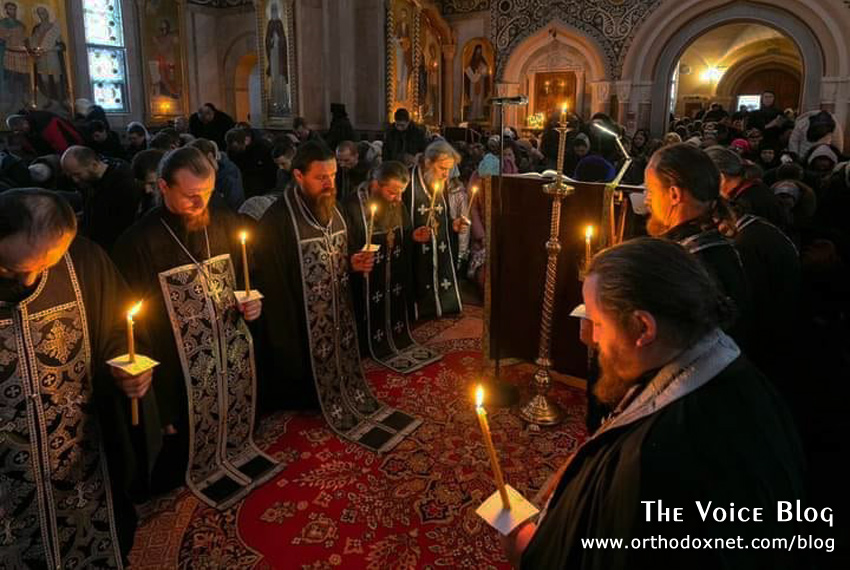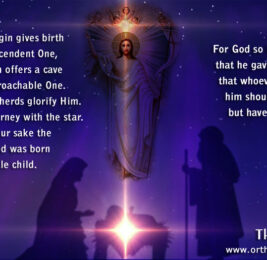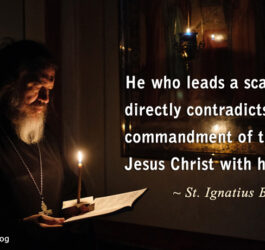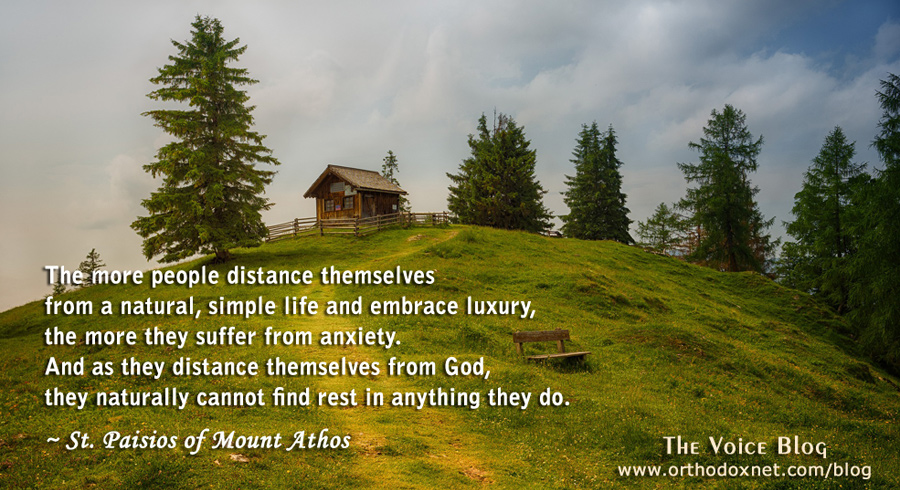 by Chris Banescu –
by Chris Banescu –
During the first week of Great Lent, the Great Canon of Saint Andrew of Crete is sung (chanted) in the evening services of the Orthodox Church, from Monday through Thursday. Known as the Great Canon of Repentance, this hymn is the longest canon in all Church services. It is also one of the most moving and transformative liturgical hymns of the Church. (The hymn is also sung on the Fifth Thursday of Great Lent with the Life of St. Mary of Egypt.)
“There is no other sacred hymn which compares with this monumental work, which St Andrew wrote for his personal meditations. Nothing else has its extensive typology and mystical explanations of the scripture, from both the Old and New Testaments. One can almost consider this hymn to be a ‘survey of the Old and New Testament.’ Its other distinguishing features are a spirit of mournful humility, hope in God, and complex and beautiful Trinitarian Doxologies and hymns to the Theotokos in each Ode,” explains Fr. Seraphim Holland.
The canon represents an inspired dialogue between St. Andrew and his soul. The central themes of this conversation are repentance and urgent exhortations to change one’s life. St Andrew decries his own sinfulness and juxtaposes that with God’s mercy. He also uses many “references to good and bad examples from the OT and NT to ‘convince himself’ to repent,” writes Fr. Seraphim. The refrain “Have mercy on me, O God, have mercy on me,” accompanies each verse of the canon.
The Great Canon makes the Scriptures come alive through powerful imagery and godly exhortations. The hymn helps us realize the depth of our sin and the tragic consequences of our separation from God. During this evening service with the church in darkness, the clergy join the faithful in the middle of the church and worship together holding candles.
As we participate in the Church services, sing the hymn, and prostrate ourselves before God, we are mystically transformed into active participants. We begin to experience the Bible passages ourselves. The stories of creation, the rebellion against God, the fall from grace, and the redemption, become the stories of my creation, my rebellion, my fall, and my redemption.
When we pray the Great Canon of Repentance, we realize how far we have strayed from God and are moved to repentance. We mourn our sinfulness and lament our transgressions. But our fervent prayers help us to come to our senses. We arise from our slumber and rush back to Christ, our only King and Savior. We humble ourselves before the Lord and plead for His forgiveness. We glorify the Holy Trinity and give thanks to God for His immeasurable love, grace, and mercy.
A Canon is an Ancient Liturgical Hymn
According to Fr. Seraphim, “a canon is an ancient liturgical hymn, with a very strict format.” It typically consists of a variable number of parts, each called an “ode.” The word “ode” comes from a Greek word for “song” and is a form of lyric poetry that’s usually addressed to someone.
Most common canons have eight Odes [Songs], numbered from one to nine, with Ode 2 being omitted. The most penitential canons have all nine odes. Some canons have only three Odes [Songs], such as many of the canons in the “Triodion” (which means “Three Odes”).
Fr. Seraphim also points out the essential purpose of the Great Canon of Repentance of St. Andrew of Crete:
The Great Canon was written by a holy man to teach himself the right way to live. We cannot benefit from it unless we make it a priority to stand in prayer, in the church, and listen to it, with a great desire and expectation for God’s grace to teach us and heal us. Our theology is first and foremost – experienced and prayed, and not only “studied”.
The majesty, power, and holiness of the Great Canon of St. Andrew can only be fully understood and appreciated by participating in the Orthodox Church services. This is the living theology of the Orthodox Church that must be experienced, prayed, and practiced when we worship God inside the Church.
Texts of the Great Canon of St. Andrew of Crete
Monday – First Week of Lent (pdf)
Tuesday – First Week of Lent (pdf)
Wednesday – First Week of Lent (pdf)
Thursday – First Week of Lent (pdf)
Thursday – Fifth Week of Lent (pdf)
Great Compline with Canon of Repentance (English) – St. Tikhon’s Seminary
Canonul cel Mare al Sfantului Andrei Criteanul (Romanian) – Orthodox Church Choir in Moldova
This is a moving rendition of the hymn from a monastery in Moldova. While the music is in Romanian, you can still appreciate the beauty and holiness of these Orthodox Christian services; a window into heaven and the eternal reality of the true GOD.
Canonul cel Mare al Sfantului Andrei Criteanul (Romanian) – Part 1
Services from the Patriarchal Cathedral in Bucharest (Catedrala Patriarhală din București).
Sources adapted from:
St. Nicholas Russian Orthodox Church in McKinney, TX
The Great Canon of St. Andrew of Crete
(Photo credit St Elisabeth Convent, Minsk, Belarus)



